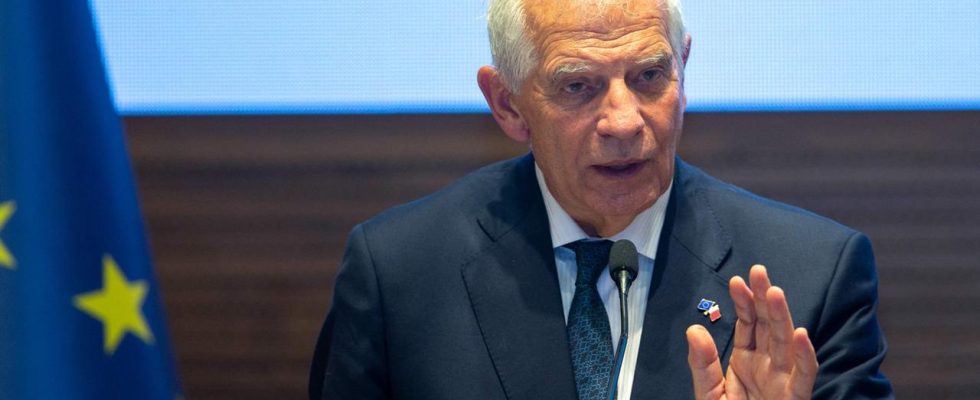In the Middle East conflict, many countries are increasingly pushing for a two-state solution. EU chief diplomat Borrell presented a strategy before the meeting of EU foreign ministers. Israeli Prime Minister Netanyahu and Hamas reject such a solution.
Several countries have advocated a two-state solution to end the war in the Middle East. The EU’s chief diplomat Josep Borrell presented a possible strategy. “We have to stop talking about the peace process and start talking more concretely about the process of the two-state solution,” said the Spaniard at a meeting of EU foreign ministers with colleagues from the Middle East. He knows that this is a difficult topic. But there is a moral obligation to do everything possible to look for a solution.
Borrell did not comment on the details of his concept. However, it should serve as a basis for the discussions. The Secretary General of the League of Arab States, Ahmed Abul Gheit, as well as the foreign ministers from Saudi Arabia, Egypt and Jordan were expected to attend the talks in Brussels. Separate rounds of exchanges were also planned with Israeli Foreign Minister Israel Katz and the Foreign Minister of the Palestinian Authority, Riad Malki.
According to Borrell, it is particularly important to examine what causes are currently preventing the implementation of a two-state solution. “Hamas is one of them – an important one – but there are others,” he said, referring to resistance in Israel. In the EU, a two-state solution means that Israel and an independent, democratic Palestinian state live peacefully side by side. Regarding the current Israeli military operation in the Gaza Strip, he said that peace and stability cannot be achieved through military means alone.
Baerbock speaks up Two-state solution out of
Federal Foreign Minister Annalena Baerbock also called the two-state solution “the only solution” to the conflict. “There can only be peace if there is peace for all people in the region.” It is therefore crucial for the federal government to do everything in its power to bring about a two-state solution, even if the situation currently appears “more than hopeless”.
Israeli Prime Minister Benjamin Netanyahu rejects an independent Palestinian state. Baerbock made his criticism of Netanyahu clear without mentioning him by name. “Even those who don’t want to know anything about it have not yet come up with any other alternative,” she said in Brussels. Baerbock pointed out that, according to US information, Israel now allows flour deliveries to the Gaza Strip via its port of Ashdod. This is a small step to alleviate the humanitarian situation. “A tiny step towards a two-state solution, but it is precisely these small steps that are needed now,” she added.
In addition to Germany and the EU, Great Britain and the USA are also pushing for the creation of an independent Palestinian state. However, Netanyahu rejected US President Joe Biden’s claim that a two-state solution after the Gaza war was feasible with him as head of government. “I will not compromise when it comes to full Israeli security control over the entire area west of the Jordan – and that is contradictory to a Palestinian state,” Netanyahu wrote on Platform X.
Saudi Arabia demands Palestinian state
Calls for a two-state solution were also heard from Saudi Arabia. Foreign Minister Prince Faisal bin Farhan described the prospect of a Palestinian state as a prerequisite for his country’s normal relations with Israel. As long as there is no credible path to this goal, Saudi Arabia will not take part in the reconstruction of the Gaza Strip, said Bin Farhan in an interview broadcast on the US television channel CNN.
His country rejects a return to the status quo as before the start of the current war. Bin Farhan contradicted Netanyahu, who rejects a Palestinian state but at the same time seeks a compromise with Saudi Arabia. Before the war began, Netanyahu said Israel and Saudi Arabia were close to a US-brokered deal to normalize their relations. A civilian nuclear program in Saudi Arabia and US security guarantees were also planned.
Martin Sailer, NDR, tagesschau, January 22nd, 2024 1:57 p.m

